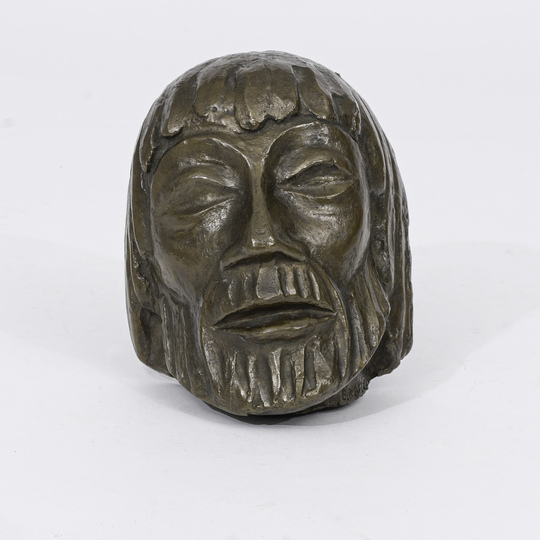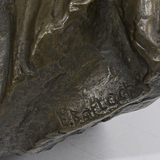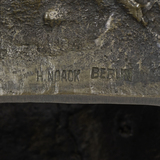Christusmaske VI
Ernst Barlach (Wedel/Holst. 1870 - Rostock 1938)

Lot-No. 544
Proceeds : 3.500 €
Terracotta model from 1931, from 1947 bronze casting of 15 unnumbered examples. Bronze. H. 15,5 x B. 12 x T. 9 cm. Signed under the chin on the side. E. Barlach, foundry mark H. NOACK BERLIN. Strictly stylised, archaic-looking face of a bearded man with a crown of hair. - The Christ mask is a design for the single figure 'Teaching Christ' - Expertise: Certificate from Ernst Barlach Nachlaßvertretung GmbH dated 27 March 1984 - Literature: Schult I 383; Kat. Güstrow 2004, Nr. 25; Laur 485 - German sculptor, writer and illustrator. B. studied 1888-95 at the Hamburg Kunstgewerbeschule and at the Dresden academy. He lived in Paris for two years before working as ceramicist in Hamburg, among others for the Altona manufactory Mutz. A journey to Russia became distinctive for his work. He first exhibited sculptures from Russian folk life at the Berlin secession in 1907. Subsequently he received many important public commissions. B. was very much pressurized by the Nazis, a. many of his works were seized or destroyed. Today he is appreciated as one of the most important sculptors of the 20th cent. Mus.: Hamburg (Ernst Barlach Haus), Nuremberg (Germanisches Nationalmuseum), Schwerin a. others. Lit.: Schult (cat. rais.) a. others.
Ernst Barlach: Christusmaske VI
Ernst Barlach (Wedel/Holst. 1870 - Rostock 1938)
Christusmaske VI
Lot-No. 544
Proceeds : 3.500 €
Terracotta model from 1931, from 1947 bronze casting of 15 unnumbered examples. Bronze. H. 15,5 x B. 12 x T. 9 cm. Signed under the chin on the side. E. Barlach, foundry mark H. NOACK BERLIN. Strictly stylised, archaic-looking face of a bearded man with a crown of hair. - The Christ mask is a design for the single figure 'Teaching Christ' - Expertise: Certificate from Ernst Barlach Nachlaßvertretung GmbH dated 27 March 1984 - Literature: Schult I 383; Kat. Güstrow 2004, Nr. 25; Laur 485 - German sculptor, writer and illustrator. B. studied 1888-95 at the Hamburg Kunstgewerbeschule and at the Dresden academy. He lived in Paris for two years before working as ceramicist in Hamburg, among others for the Altona manufactory Mutz. A journey to Russia became distinctive for his work. He first exhibited sculptures from Russian folk life at the Berlin secession in 1907. Subsequently he received many important public commissions. B. was very much pressurized by the Nazis, a. many of his works were seized or destroyed. Today he is appreciated as one of the most important sculptors of the 20th cent. Mus.: Hamburg (Ernst Barlach Haus), Nuremberg (Germanisches Nationalmuseum), Schwerin a. others. Lit.: Schult (cat. rais.) a. others.






